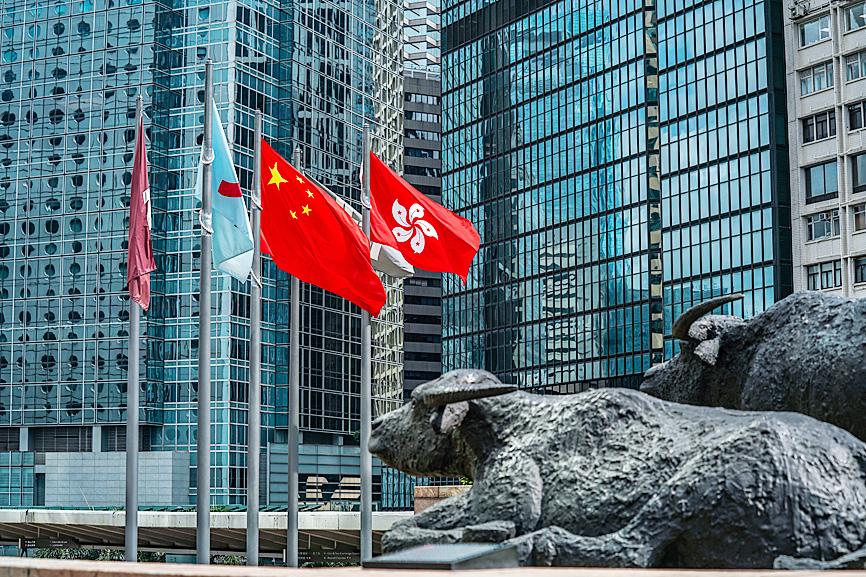Due to the newly implemented Hong Kong national security legislation, the Mainland Affairs Council (MAC) has drawn up a list of what it described as “high-risk groups,” cautioning them not to travel to Hong Kong.
People who support independence for Taiwan, Hong Kong, Tibet and Xinjiang; those who are critical of the Chinese Communist Party (CCP), the Hong Kong government and the “one country, two systems” concept; and those who donated to or voiced support for the Hong Kong anti-extradition bill movement are urged to refrain from visiting Hong Kong, the council said on its Web site.
It released two posts on the matter, one on Friday and the other yesterday.

Photo: Bloomberg
The National Security Law was passed by the Chinese National People’s Congress last month and took effect on June 30, defining and prohibiting acts of secession, subversion, terrorism and collusion with foreign forces.
According to the council, the legislation is not limited to the territory of Hong Kong, its people, or aircraft and ships registered in Hong Kong, but is applicable worldwide, and the CCP is the sole entity that defines how it works.
The legislation aims to prevent any person or organization from separating lands claimed by China from China; rebelling and overthrowing the CCP, or the Hong Kong special administrative government, including to prevent the destruction of governmental facilities; commiting acts of terrorism against people, transportation, sources of water, power, broadcasting and Internet networks; and colluding with foreign nations or powers against the interest and safety of the nation, which includes preventing the enactment of policies and laws, and inciting hatred against the CCP and the Hong Kong special administrative government, the council said.
Any actions, such as liking Facebook posts, joining forums, forwarding posts or links, wearing apparel or holding flags, regardless of their directness or indirectness, or whether violence was used, are considered a breach of the legislation and could be punished by life imprisonment, the council said.
The government would be closely monitoring the situation in Hong Kong and would announce the results of its risk assessment at an appropriate time, the council said, adding that it has bolstered the capabilities of its branches in Hong Kong and Macau to provide assistance to Taiwanese in need.
The council urged Taiwanese to be cautious and be on high alert when traveling or transiting through Hong Kong, adding that individuals working or studying in Hong Kong should also be on high alert.
It urged those who are likely to be detained by the Chinese authorities to refrain from visiting, as they could very well become the next “Lee Ming-che (李明哲).”
Lee, a Taiwanese human rights advocate, went missing on March 19, 2017, after entering Zhuhai, Guangdong Province, from Macau. On Nov. 28 that year, Lee was found guilty of sedition and sentenced to five years in prison.
The council urged Taiwanese to fill in their details on its Web site if they must visit Hong Kong or Macau and call the MAC’s 24-hour emergency number in Hong Kong: 852-6143-9012, or Macau, 853-6687-2557 if they have problems.

A Ministry of Foreign Affairs official yesterday said that a delegation that visited China for an APEC meeting did not receive any kind of treatment that downgraded Taiwan’s sovereignty. Department of International Organizations Director-General Jonathan Sun (孫儉元) said that he and a group of ministry officials visited Shenzhen, China, to attend the APEC Informal Senior Officials’ Meeting last month. The trip went “smoothly and safely” for all Taiwanese delegates, as the Chinese side arranged the trip in accordance with long-standing practices, Sun said at the ministry’s weekly briefing. The Taiwanese group did not encounter any political suppression, he said. Sun made the remarks when

The Taiwanese passport ranked 33rd in a global listing of passports by convenience this month, rising three places from last month’s ranking, but matching its position in January last year. The Henley Passport Index, an international ranking of passports by the number of designations its holder can travel to without a visa, showed that the Taiwan passport enables holders to travel to 139 countries and territories without a visa. Singapore’s passport was ranked the most powerful with visa-free access to 192 destinations out of 227, according to the index published on Tuesday by UK-based migration investment consultancy firm Henley and Partners. Japan’s and

BROAD AGREEMENT: The two are nearing a trade deal to reduce Taiwan’s tariff to 15% and a commitment for TSMC to build five more fabs, a ‘New York Times’ report said Taiwan and the US have reached a broad consensus on a trade deal, the Executive Yuan’s Office of Trade Negotiations said yesterday, after a report said that Washington is set to reduce Taiwan’s tariff rate to 15 percent. The New York Times on Monday reported that the two nations are nearing a trade deal to reduce Taiwan’s tariff rate to 15 percent and commit Taiwan Semiconductor Manufacturing Co (TSMC, 台積電) to building at least five more facilities in the US. “The agreement, which has been under negotiation for months, is being legally scrubbed and could be announced this month,” the paper said,

MIXED SOURCING: While Taiwan is expanding domestic production, it also sources munitions overseas, as some, like M855 rounds, are cheaper than locally made ones Taiwan and the US plan to jointly produce 155mm artillery shells, as the munition is in high demand due to the Ukraine-Russia war and should be useful in Taiwan’s self-defense, Armaments Bureau Director-General Lieutenant General Lin Wen-hsiang (林文祥) told lawmakers in Taipei yesterday. Lin was responding to questions about Taiwan’s partnership with allies in producing munitions at a meeting of the legislature’s Foreign Affairs and National Defense Committee. Given the intense demand for 155mm artillery shells in Ukraine’s defense against the Russian invasion, and in light of Taiwan’s own defensive needs, Taipei and Washington plan to jointly produce 155mm shells, said Lin,